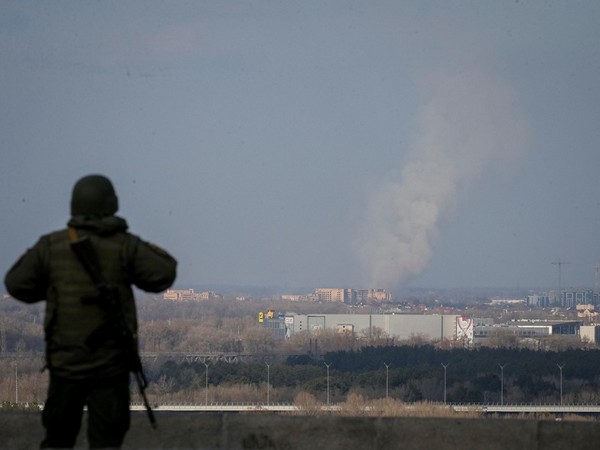WRAPUP 5-Fighting intensifies in east Ukraine, Kyiv seeks more weapons
The terrorist state will not understand anything else," Zelenskiy said in his nightly television address on Thursday. Local officials on Friday reported heavy shelling in the north, northeast and east of Ukraine, scene of some of the heaviest combat since Russia's invasion on Feb. 24 last year.

- Country:
- Ukraine
Russia has stepped up attempts to break through Ukraine's defences with heavy fighting in the north and east of the country, underlining Kyiv's need for more Western weapons, Ukrainian officials said on Friday. The Ukrainian military said fierce battles were under way, a day after Russian missiles and drones killed at least 11 people in what appeared to be a response to promises by Western nations to supply Ukraine with tanks.
After weeks of wrangling, Germany and the United States have promised Ukraine dozens of modern tanks to help push back Russian forces, opening the way for Canada, Poland, Finland, Norway and others to follow suit. Russia accused the United States of "pumping weapons into Ukraine" and chided President Joe Biden, saying he held the key to ending the conflict in Ukraine - which Moscow says does Washington's bidding - but had not used it.
Ukrainian President Volodymyr Zelenskiy thanked allies for their support but renewed calls for tougher sanctions on Moscow and more weapons to repel the invaders in the twelfth month of the war. "This evil, this Russian aggression can and should be stopped only with adequate weapons. The terrorist state will not understand anything else," Zelenskiy said in his nightly television address on Thursday.
Local officials on Friday reported heavy shelling in the north, northeast and east of Ukraine, scene of some of the heaviest combat since Russia's invasion on Feb. 24 last year. "Fierce fighting continues along the front lines. Our defenders are firmly holding their positions and inflicting losses to the enemy," said Oleh Synehubov, governor of the northeastern region of Kharkiv.
Reuters could not verify battlefield reports. PROBING ATTACKS Front lines have been largely frozen over the past two months, with Russia trying to gain ground in the east after occupying swathes of territory there and protect a corridor of land it has seized in southern Ukraine. Both sides are widely expected to launch a spring offensive though the United States has publicly advised Ukraine against doing so until the latest weapons are in place and training has been provided -- a process expected to take several months.
Oleskandr Musiyenko, head of the Military and Strategic Research Centre of Ukraine, said Russia was sending in more reinforcements, mainly conscripts, to block Ukrainian advances. "But they do not have the level of artillery and tank support they had on Feb. 24," Musiyenko told Ukrainian television.
Britain said in an intelligence update that Russian forces had probably conducted probing attacks near Orikhiv in southeastern Ukraine and in Vuhledar in the east, but were unlikely to have achieved "substantive advances." Russian forces are intensifying the fight along the eastern front line, using their recent capture of the town of Soledar to build pressure on the besieged city of Bakhmut nearby where Ukrainians have held back an onslaught for months.
"Where will the main (Russian) strike occur? For now, we have no idea," said Mykola Sunhurovskiy, director of military programmes at Ukraine's Razumkov Centre think tank, warning of possible "diversionary strikes" to confuse Ukraine's military. CHILDREN DEPORTED
Russia's invasion has killed thousands of civilians, uprooted millions and reduced cities to rubble. Thursday's missile and drone strikes were the latest in a series of Russian attacks on energy facilities that have depriving millions of people of heating, light and water.
Ukraine also accuses Moscow of deporting children as well as adults from occupied areas and giving them Russian passports, actions condemned by the U.N.'s refugee agency (UNHCR). "Giving them (Russian) nationality or having them adopted goes against the fundamental principles of child protection in situations of war," UNHCR chief Filippo Grandi told Reuters after touring Ukraine. "This is something that is happening in Russia and must not happen."
Kyiv's allies have imposed several rounds of sanctions on Russia, hoping to hinder its ability to wage war. Japan tightened sanctions against Russia on Friday, expanding an export ban list and freezing assets of Russian officials and entities.
But Ukraine's hopes that the European Union will impose sanctions affecting nuclear energy were dealt a blow by Hungary, which said that it would veto such moves. Hungary has a Russian-built nuclear plant which it plans to expand. The United States also increased pressure on Russia on Thursday by designating the Wagner Group, a private Russian mercenary company, as a transnational criminal organisation, freezing its U.S. assets for helping Russia's military.
The Kremlin brushed off the decision, saying Washington had been "demonising" the group for years without basis. Russian Foreign Minister Sergei Lavrov has meanwhile been visiting Africa to shore up support for Moscow. His latest stop on a tour that began in South Africa was in Eritrea.
Russia has shifted the focus of its rhetoric from "denazifying" and "demilitarising" Ukraine to confronting what is says is an aggressive and expansionist U.S.-led NATO alliance. Ukraine and the West say the invasion on Feb. 24, 2022 was an unprovoked act of aggression.
(This story has not been edited by Devdiscourse staff and is auto-generated from a syndicated feed.)
ALSO READ
Egypt Calls for UN Security Council Reform to Amplify Africa's Role
African Soccer Enters a New Era with Major Changes
Achraf Hakimi: Morocco's Star Ready for Africa Cup of Nations Comeback
Africa Cup of Nations to Shift to Quadrennial Format
Africa Cup of Nations Revamped: Four-Year Cycle Announced










